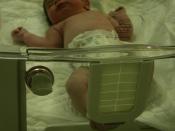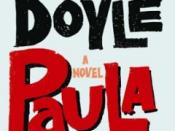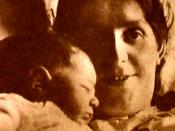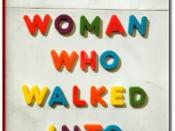Looking at the Troubled Life of an Abused Woman, Paula Spencer, in "ÃÂThe Woman Who Walked Into Doors' One of Roddy Doyle's novels, The Woman Who Walked Into Doors', is a profound insight into the life of a woman who is battling through life with little money, an abusive husband and alcoholism. Paula Spencer lives everyday of her life in a blur of self-pity and confusion.
The story is written in first person narrative to relay the intensity of her feelings. To the reader the thoughts, experiences and memories are transmitted from Paula straight to their own thoughts. It is as if we are a true part of her life. The way she thinks is directly related to the way the book is written. The disorderly narrative, jumping from one instance to another compares closely to that of a persons memories.
Doyle shows the way Paula is uncertain whether what she remembers of her past is the truth or a figment of her imagination.
She endeavours to remember good memories of her childhood, especially her father. Her older sister, Carmel, does not recall these events, or does not wish to, which would suggest that Paula is imagining them the way she chooses to. Nevertheless Paula tends to ignore Carmel and accuses her of "spoiling things"ÃÂ. Paula wishes to remember her childhood as happy but from what Doyle says it was not and Carmel tells her she imagines things, which is destroying Paula's memories.
Paula attempts to convince Carmel and their younger sister, Denise, that what she recollects is real. She also wishes to prove it to herself.
"-He was nice, he sang a lot, didn't he? -So did Hitler -Ah stop Carmel will yeh, I said. -Is that the best you can do? -I know what you're up to, she said -What? -I know -What? -Rewriting history, she said.
-Fuck off Carmel will you."ÃÂ (Page 56-57) Paula wishes to keep her memories of her father true but her sister, Carmel continues to reveal the real truth. Doyle shows irony her as the relationship between Paula and her father is a parallel with the relationship between Paula and Charlo. In both cases she denies the reality, trying to believe that she is "ÃÂloved'. Paula dislikes this as the imaginary security of her past is taken away from her.
Paula wishes to feel secure. She craves people surrounding her, being her support; people who can help her problems vanish.
Paula works by cleaning offices and houses for people who are well off. The offices she cleans are open plan and she expresses her dislike of them. She prefers them to have walls.
" I prefer walls; you need something to lean on "ÃÂ (page 107) The wall is a metaphor. It represents Paula's want for someone to "lean on"ÃÂ. She needs a support, someone to depend on.
Security is one of Paula's main needs. Doyle shows this need when she becomes "Charlo's girl"ÃÂ. Charlo was a tough guy of their generation and because Paula was courting him his label protected her. Doyle also shows that when Paula was growing up anything that they did gave them a name. Girls were given the name "slut"ÃÂ depending on the types of cigarettes they smoked or even the way that they held their posture.
" It was alright to sit or lean on the wall during the day but not when it began to get dark. ...
Sitting on a wall in the dark got you a name for yourself"ÃÂ (page 48) This was the way girls were branded if they showed interest in a boy or how and where they spent time with their friends. On the other hand if they did not remotely associate themselves with the normal evolution of teenage life they were called "tight and dry and a Virgin Mary"ÃÂ. Doyle shows this throughout the story She talks about the social life of her childhood with great remorse, but when she talks about when she and Charlo first started dating the tone lifts not to cheerfulness but more happy than the rest of the book.
" I could have walked around in my nip with twenty Major in my mouth combing my pubic hair and nobody would have said a word. I was Charlo's girl now and that made me respectable."ÃÂ (Page 49) Paula did not begin to date Charlo because she thought that she could become respectable because of him but because she loved and felt safe with him. She married him because her father hated him. This is where a slight lack of respect towards Charlo is displayed from Paula, and is the only time in the book in which it occurs. However the disregard that Charlo has for Paula is viewed from the day of their wedding. From that day (one of the happiest for Paula) her dream relationship began to collapse. This appears to be the trigger for Paula's drinking problem and where Charlo became abusive towards her. Paula did not blame him she believed that it was something that she had done wrong, something that she deserved. Doyle's representation of the way she blamed herself is remarkable, he captures the sense that the reader is not being told about what is going on but as if they are remembering it for themselves as it had already happened.
" What happened? I said, Make your own fuckin' tea. That was what happened. Exactly what happened. I provoked him. I always provoked him. I was always to blame. I should have kept my mouth shut. I could provoke him that way as well. Not talking. Talking. Looking at him. Not looking at him. Looking at him that way. Not looking at him that way. Looking and talking. Sitting, standing. Being in the room. Being."ÃÂ (Page 163) The short sentences that Doyle used in the snippets such as these throughout the novel gives the impression that these thoughts were racing through Paula's head. She blamed herself for a lot of the thing Charlo did to her. I don't believe that she provoked him in anyway. Paula wants to believe that Charlo is a good man and repeatedly explains to herself that everything is her fault. After Charlo has become angry and beats her he kneels down, as Paula is usually huddled on the floor, to inspect her face. She thinks that this is the way Charlo shows he cares but I think he is looking for physical evidence that he assaulted her so as not to be discovered. Not only did Charlo beat Paula he also slept with other women yet she knew it was because she was not good enough for him.
Throughout their eighteen-year marriage, throughout the violence, the sexual and mental abuse Paula never doubted that she loved Charlo despite what he had done to her, the way he changed her life for the worse. When she threw him out she still missed him.
"I still think of Charlo.
I miss him.
I want him to come back."ÃÂ (Page 91) The reaction of the reader, which Doyle creates, is mixed. There is a feeling of happiness because she has done the right thing yet a feeling of sympathy lingers, as she is still unhappy. She is now alone.
On reading the text I get the faint impression that she secretly wants to leave him but was too afraid of being alone. Paula would always find an excuse, a reason for staying with this abusive man. She visited the hospital many times to have her injuries treated, injuries that Charlo had caused. She would always tell the staff that she fell down the stairs or tripped and banged into a door. We know that she had desired the doctors to ask how it had actually happened so she could get her whole situation out into the open. She could have been cared for and protected.
" I waited to be asked. Ask me. Ask me. Ask me. I'd tell her Look at the burn. Ask me about it. Ask. (Page 164) Dolye's use of minor, short sentences and repetition shows the yearning from Paula to have her abusive situation brought into the light. They never did ask. Doyle shows the way an abused person can feel trapped and alone.
Paula lacked the strength and will power to leave Charlo. Her deepest fears about him were overcome when she started to notice him turning onto his children, especially their eldest Nicola. Paula's attention was caught when she saw Charlo "looking that way"ÃÂ at Nicola. Paula sees her children as the best things in her life and when the safety of one of her children was in question she defied all odds within herself and challenged Charlo. Paula does not want her children to live the life that she has known. Paula has four children; Nicola is grown and works next is John-Paul who is not an active part of the family, his location is unknown because of his drug addiction. However the two youngest, Leanne and Jack have their mother and are doing well and Paula thinks that these two will definitely make something of themselves. Doyle shows Paula's protective maternal instincts, when Nicola is threatened. She realises that during their marriage Charlo didn't beat her out of love but because he could over power her. Paula had finally come to her senses. She knew the instance that Charlo was going to lose his temper and instead of giving in she struck him with a frying pan and expelled him from their home and their lives. He did not return.
" It was a great feeling. I'd done something good"ÃÂ (page 226) The reaction of the reader that Doyle wished to create here is excitement and tremendous relief. As we now know this is the point that Paula took hold of her life and began to turn it around.
"ÃÂThe Woman Who Walked into Doors' lacks any kind of rigid structure, this represents the lack of any order in Paula's mind as the reader is receiving a first hand account of what she has gone through. Paula has a tendency to stray from the subject, which suggests that she allows her mind to wander. Two of the chapters begin by Paula reintroducing herself to the reader, which shows her problem with alcoholism. The book is written as though Paula is remembering the events. This proves effective when we are attempting to relate to Paula. As it is like the reader is inside her mind it is easier to understand the way she thinks and feels.
Roddy Doyle's impression of the life of an abused alcoholic woman is outstanding. His method of writing it in first person narrative allowed the reader to connect more closely to what his character was feeling. I think his intention was to create sympathy and compassion for Paula and the many thousands like her. Abuse is a very secretive subject and well hidden in marriages such as this one. Doyle shows the life of a person, who is being abused, and their struggle to protect and provide for their children. This does not happen in all cases. When Paula finally got the courage to face Charlo it made me feel relieved and happy that she had been able to achieve what she hoped for, even dreamed of. At the end of the book she still had a battle with alcoholism but Paula is only a person like anyone else and for her to repair all of her bad times will take years longer than it did to create her alcohol problem in the first place. I think Roddy Doyle's message in this book was not only to put into view the abusive nature of certain people but to show that everyone has the strength within ourselves to ascend beyond what we show on the surface and what others think we are capable of doing.
Words: 1,889





